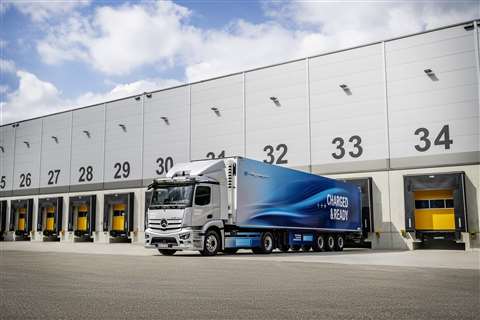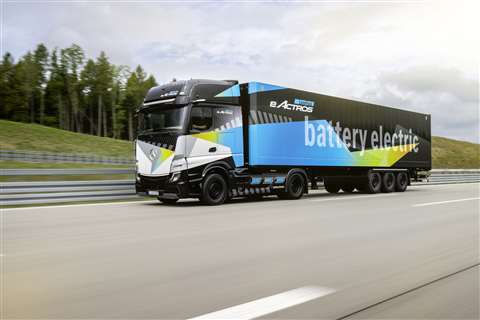Mercedes-Benz to use e-trucks in its own supply chain
28 November 2022
 An integral part of the concept for emissions-free delivery traffic will be a charging infrastructure at the Wörth site. It will allow e-trucks to recharge on site, including as cargo is being unloaded. (Photo: Mercedes-Benz Trucks)
An integral part of the concept for emissions-free delivery traffic will be a charging infrastructure at the Wörth site. It will allow e-trucks to recharge on site, including as cargo is being unloaded. (Photo: Mercedes-Benz Trucks)
In addition to diesel-powered vehicles, Mercedes-Benz Trucks’ heavy-duty truck assembly plant in Wörth am Rhein, Germany, is home to the battery-electric Mercedes-Benz eActros and eEconic. To further its goal of 100% electrification of delivery traffic to its largest truck plant by the end of 2026, the company is working with logistics service providers and freight forwarders that supply the facility to increasingly integrate electrically powered trucks into their fleets.
“We want to drive the transformation of our industry forward quickly, which is why we are active on all levels of electrification. Therefore, we are going beyond vehicle development, manufacturing and providing accompanying services,” said Karin Rådström, CEO, Mercedes-Benz Trucks. “We are working intensively on the electrification of our own direct supply chains. There is great potential here, as well as great interest among our partners, whom we are strongly supporting on this path.”
Several freight forwarders will be participating in the pilot phase, which is set for implementation in 2023. Electrically powered eActros 300 tractors will initially be utilized, with the eActros LongHaul and other models added later; series production of the eActros LongHaul is targeted in 2024.
 Electrically powered eActros 300 tractors will initially be utilized for the pilot phase, with the eActros LongHaul and other models added later. (Photo: Mercedes-Benz Trucks)
Electrically powered eActros 300 tractors will initially be utilized for the pilot phase, with the eActros LongHaul and other models added later. (Photo: Mercedes-Benz Trucks)
To develop a targeted concept for zero-emission delivery logistics to the plant, the company will work with freight forwarders to analyze their regular routes, providing information on travel times and distances between delivery locations, charging options and individual truck ranges. Mercedes-Benz will also provide support in integrating e-trucks into existing fleets and in realigning logistics centers, including advice on setting up the appropriate in-house charging infrastructure network.
An integral part of the future inbound logistics concept for emissions-free delivery traffic includes establishing a charging infrastructure at the Wörth site. Approximately 50 charging columns, including megawatt charging stations for high-performance battery charging, are planned at key points for delivery traffic in the immediate vicinity of the plant. The charging infrastructure will be available to both suppliers’ and the manufacturer’s vehicles.
Parts used in vehicle production at Wörth are delivered just-in-time to the assembly line. In future, the time during which the e-truck’s cargo is unloaded will be used to recharge the vehicle’s battery, enabling the vehicle to resume its route directly after parts delivery. In addition, the potential for a new consolidation center for deliveries near the plant is currently being examined.
Plans to extend this concept to other plants in the Mercedes-Benz Trucks production will be the next step in the company’s CO2-neutral supply chain.
STAY CONNECTED




Receive the information you need when you need it through our world-leading magazines, newsletters and daily briefings.
POWER SOURCING GUIDE
The trusted reference and buyer’s guide for 83 years
The original “desktop search engine,” guiding nearly 10,000 users in more than 90 countries it is the primary reference for specifications and details on all the components that go into engine systems.
Visit Now
CONNECT WITH THE TEAM










